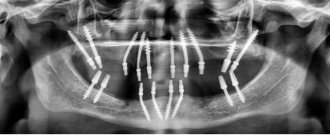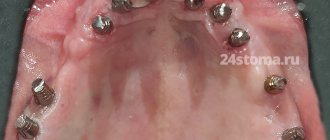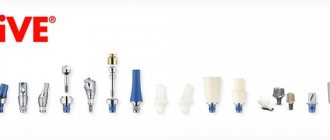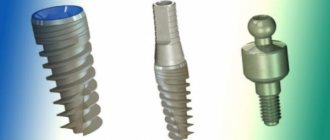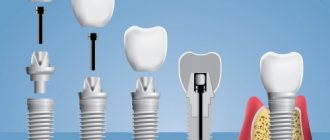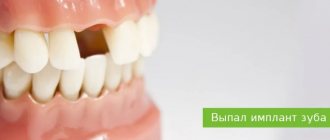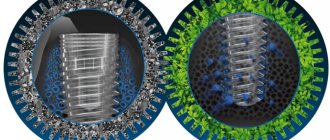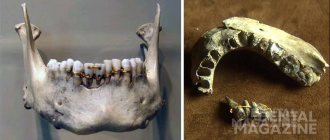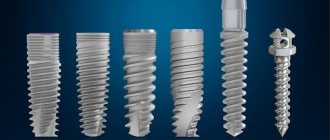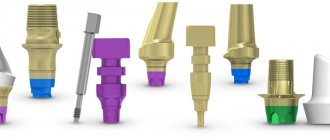Dr. Kizim
>
Articles
>
Biomed implants are the optimal choice for basal implantation
In orthopedic dentistry, dental prosthetics using the implantation method is becoming increasingly common. The main factors ensuring a successful operation are a high-quality implant and the skill of the implantologist.
At Dr. Kizim's clinic you use Biomed implants manufactured by the Swiss company Ihde Dental AG. They are distinguished by high quality and reliability.
General information
Oneway Biomed is a brand of implants manufactured by Ihde Dental AG (Switzerland) since 1989. The company is headed by Stefan Alfred Eid, MD, professor and maxillofacial surgeon, who was one of the first developers of basal implantation. The history of the company began with the development of disc implants, the implantation of which was carried out in conditions of acute atrophic processes of bone tissue. However, due to their rather traumatic environment, the company's development began in a slightly different direction: in the field of developing implants that would resolve even the most difficult clinical situations associated with a lack of bone tissue in a less traumatic way with immediate loading of the prosthesis.
Basal implants: prices for 2022
We analyzed prices for Ihde Dental implants in clinics in Moscow and St. Petersburg. It should be noted that there are very few clinics that generally provide basal implantation services.
- Basal implants: price in Moscow for surgical installation of 1 BCS® or KOS® implant - from 32,000 rubles.
And the turnkey price of 1 implant together with a metal-ceramic crown will be about 46,000 rubles (a design of several implants is calculated in proportion to the number of implants and crowns on them). Prosthetics for a completely toothless jaw will cost you approximately 300,000 rubles. This price already includes the entire required number of BCS or KOS implants (from 8 to 10), as well as a permanent horseshoe-shaped bridge made of metal-plastic. In Moscow, these implants, but under the Oneway Biomed brand, are installed in the Smile-at-Once clinic.
- Basal implants: price in St. Petersburg for surgical installation of 1 BCS® or KOS® implant - from 22,000 rubles (plus an additional cost of a crown of about 12,000 rubles). In St. Petersburg, the installation of Ihde Dental implants is carried out by the “Clinic of Swiss Implantology” (swissimplant.ru).
Indications and contraindications for implantation
Indications
Implantation of artificial teeth will be indicated in the following situations:
- presence of dental defects;
- increased tooth wear;
- complete absence or absence of several teeth in a row;
- absence of end teeth (there is no support for the prosthesis, it will be an implant);
- impossibility of installing a removable prosthesis, including due to rejection;
- lack of dental occlusion.
Contraindications
Contraindications to dental implantation can be both absolute and relative. The latter include, for example, easily curable diseases of the teeth and oral cavity (caries, gum disease) or general diseases of the body. After treatment, the implant installation procedure can be performed without interference. Absolute contraindications include:
- the patient's mental illness, which may interfere with implant placement;
- blood diseases;
- tuberculosis and complications of the disease;
- immune system disorders;
- bruxism (teeth grinding) and increased tone of the masticatory muscles;
- connective tissue diseases;
- endocrine pathologies;
- intolerance to anesthetics (without them installation is impossible);
- oncology;
- diabetes.
Contraindications
Reasons to completely refuse or postpone the installation of Biomed implants:
- risk of complete lack of load or overload of implants (habit of chewing on one side, semi-paralysis);
- asymmetry of the chewing surfaces of the right and left sides;
- blood clotting disorder;
- deviations in the functioning of the nervous system;
- disruption of bone regeneration processes;
- pregnancy, breastfeeding;
- disturbances in the functioning of the immune system;
- chronic diseases:
- tuberculosis;
- insulin dependent diabetes.
Issues that pose less of a threat but require attention:
- chemotherapy;
- acute rheumatism;
- neuroses, mental disorders;
- inflammation of the gums;
- contraindications to anesthesia;
- poor oral hygiene.
- Complete restoration of the dentition in just 4 days!
more detailsRoott Pterygoid Implants Sinus lift is no longer needed!
more details
Once and for life! Express implantation in 4 days with a permanent ReSmile prosthesis
more details
All-on-4, All-on-6, ReSmile, Zygomatic implantation We use all modern methods of dentition restoration
more details
The presence of contraindications is not always a reason to exclude the installation of implants. The severity of the pathology plays an important role.
Features and advantages of Biomed implants
Oneway Biomed implants are created in Switzerland. The plant uses modern equipment and uses innovative technologies to develop products. Each implant is carefully checked, which guarantees high quality products and minimal risk of rejection by the body.
Biocompatible material
For the manufacture of Oneway Biomed implants, “pure” titanium alloy Ti-6Al-4V ELI (Grade 5) is used. It does not contain toxic or allergenic elements, which distinguishes the material with maximum strength, tear resistance and excellent biocompatibility with the human body. This means that the installed implants will not be perceived by cells as a foreign object, which will allow the structures to completely merge with the bone tissue.
Wide range of products
The company offers more than 350 different modifications of implants that solve almost any problem, including the most complex ones associated with the presence of acute bone atrophy. The range includes both classic two-component implant models and monoblock models with different types of abutments: straight, angled and folding. The two-piece implant components also come in a wide variety to maximize aesthetics, correct existing malocclusions, and align the prosthesis even when the implant is installed at an angle.
Precise positioning in bone
When carrying out treatment using implants of this brand, 3D modeling is used. Using a special computer program, the entire treatment process is simulated - this allows you to select the area with the highest quality bone, without touching the nasal sinus in the upper jaw and the trigeminal nerve in the lower jaw. In addition, during the installation of implants, individually created surgical templates are used without any problems: during the implantation phase, they guarantee the precise positioning of the implants in the chosen location and position at a certain angle.
Active thread for minimally invasive installation
Depending on the model, Biomed implants have active or compression self-tapping threads. This makes it possible to use a minimally invasive method during installation, that is, low-traumatic, in which massive tissue incisions are not made. The implants are screwed into the bone, which creates a compression effect: the surrounding tissues are compacted, which guarantees high primary fixation of titanium “screws”.
Effective fusion with bone tissue
The implants have a three-dimensional porous coating obtained by sandblasting the surface and acid etching at high temperatures, followed by the application of an osmoactive coating. Due to this, the surface of the implants becomes rough and consists of many small pores, which are gradually filled with growing bone cells. This significantly improves the osseointegration process.
At the same time, solid models have a smooth neck, which prevents the accumulation of plaque and bacteria - this is especially important, since it is this part of the implants that comes into contact with inflamed periodontal tissues (implants are installed even in the presence of periodontitis and periodontal disease). In addition, a smooth neck, on which plaque does not accumulate, is a kind of protection against the development of tissue inflammation around the installed implant, namely peri-implantitis.
High protection against counterfeiting
The implants have a single sterile package and a serial number, which must be entered into the patient’s medical history. In addition, the products of this brand are sold only through official distributors who supply implants to those clinics whose doctors have completed all training courses. This helps protect the patient from low-quality counterfeit products.
Other advantages of implants:
- possibility of immediate download,
- short periods of bone healing,
- wide possibilities for implantation and prosthetics,
- minimal tissue trauma during installation,
- maximum enterprise safety through the use of computer simulation,
- possibility of fixing implants in the deep parts of the jawbone,
- minimal risk of rejection and allergic reactions,
- a wide selection of abutments - for ball, rod, screw and concrete fixation,
- Lifetime warranty on implants from the manufacturer.
Manufacturing technologies
The composition of the implants is pure titanium Grade 5. They are produced using technologies developed by the company based on its own research. Subject to:
- sandblasting;
- acid etching at high temperatures;
- electrochemical surface treatment (leveling, application of an osmo-active substance).
High-tech production methods provide less resistance when screwing in and high sterility.
Types of Oneway Biomed implants
Classic two-component GIH implant
There are two series:
- "Straight". Suitable for applications with small openings. Not suitable for high pressure areas (molars) or diagonal load.
- "6 + 2". Designed for installation in the molar area. Wider and much shorter than the first line.
Characteristics of GIH rods (Hexacone):
- screw, GIH Direct has compression properties;
- 12-sided connection of the abutment (the part on which the crown is attached) to the base;
- compatibility with the most common foreign implant systems, because many types of implants are analogues of well-known manufacturers;
- full range of production processes: sandblasting, application of osmoactive substances, acid etching.
Narrow bone implants GXI
They differ in the following characteristics:
- screw type;
- wide choice of sizes: diameter of the intraosseous part - from 3 to 4.5 mm, length - 8-15 mm;
- two precise cylindrical guides for adjusting the position of the structure;
- connection on 6 sides of the abutment at the base;
- made of pure titanium.
GCS One Piece (KOS) compression units
There are three main modifications:
- Home. Straight fixed aba. The stump is inclined to the base, motionless.
- "B". The connection between the abutment and the base is flexible, which allows the dentist to independently tilt the implant at the desired angle.
Features of GCS (KOS):
- screw type with compression properties;
- monolithic design;
- 8-sided abutment head.
Cortical GBC implants for basal implantation
There are two modifications:
- Standard.
- With reinforced abutment.
Characteristics of GBC (BCS) units:
- screw type;
- fixation occurs in the basal and cortical parts of the bone;
- the surface of the rod is shiny and self-tapping;
- possibility of installation in combination with bridges;
- There is protection against turning during handling.
Lateral disc implants (TOI, BOI)
The main element of fastening the side structures are plates placed on a common base. It is practically not used due to high trauma during installation and low engraftment.
- One-part BOI.
- Two-part TOI.
Differ:
- number of plate elements;
- size, shape of plates;
- distance between plates.
Features of Lateral implants:
- plate, T-shaped;
- The main method of fastening is mechanical.
They are used for bone atrophy due to the large attachment area.
Advantages
The main advantages of Oneway Biomed rods:
- quick installation (average time - 3 days);
- immediate load;
- the starting material is a biocompatible titanium alloy (provides natural engraftment and a low likelihood of developing allergies);
- applicable for the treatment of complex cases (lack of bone, inflammatory processes);
- the possibility of installation without the procedures required for traditional implantation (sinus lifting, bone augmentation), as a result, a reduction in the overall cost of treatment;
- a large number of available models;
- high-quality surface treatment of implants;
- long warranty - from 25 years to lifetime (specific figures depend on the clinic);
- low invasiveness - screw-type systems are installed without cutting the tissue;
- Possibility of use in case of contraindications to the installation of conventional rods (smoking, bone insufficiency);
- discomfort before and after surgery is minimized.
Implantation stages
The first step in the dental implant process is developing a customized treatment plan. The plan is tailored to your specific needs and prepared by a team of specially trained professionals who are experts in surgery and prosthetics. This team approach ensures the highest possible quality of care.
The implant, which is a small titanium rod, is then placed into the bone bed of the missing tooth. As it heals, the lower jaw fuses with the titanium rod, securely fixing it in the upper jaw. The healing process may take 6 to 12 weeks.
Once the implant is attached to the jawbone, a small connecting post called an abutment is attached to it to securely hold the new tooth. To create one or more new teeth, your dentist takes impressions of your teeth and creates a model of your bite (which records all your teeth, their type, and their position). The new tooth or teeth are based on this model. A replacement tooth, called a crown, is then attached to the abutment.
Instead of one or more individual crowns, some patients may have attachments attached to the implant to hold and support the denture.
The orthodontist then selects a color for the new teeth that is closest to your natural teeth. Because the implant is anchored into the jawbone, dentures look, feel, and function just like your natural teeth.
What to look for when choosing Swiss implants?
When choosing a specific Swiss implant, you should consider the following factors:
- the type of tooth that needs to be restored with an implant;
- structural features of the patient’s bone tissue, its presence;
- chosen type of implantation;
- the number of teeth that need to be restored with implants;
- general condition of the oral cavity;
- budget allocated for implants.
In any case, the attending physician will best answer this question. Only after an initial examination and consultation can you proceed to ordering implants and planning your smile restoration.
Dentistry "32 Dent" specializes in implantation with proven Swiss dental systems. Sign up for a consultation with a specialist right now!
Analogs to Biomed implants
- Nobel Biocare (Switzerland). The implants of this company are made of titanium, which has a high degree of biocompatibility. The outer coating of Nobel implants is TiUnit, a phosphorus-enriched titanium oxide with a high degree of crystallization. This coating provides moderate surface roughness to the implant, which increases its survival and reduces adaptation time. Nobel Biocare is one of the leaders in the production of implants and equipment for implantology; the company offers a lifetime warranty on its products.
- Straumann Roxolid (Switzerland). This company uses a special alloy in the production of its implants, which in some respects is not inferior to titanium. Straumann Roxolid dental implants are thin and short implants with a special coating that make them easier to install for patients with multiple diseases. The price of these implants is slightly lower than the Nobel flagships.
- Noris Medical (Israel). Implants from this manufacturer are focused on the zygomatic (cheekbone) implant, so they are longer than all other implants. In more than half of cases, a zygomatic implant is associated with the need to compensate for the lack of bone tissue. In this regard, Noris Medical offers doctors complete systems that include all the necessary components. The cost of basal dental implantation with upper jaw prosthetics using all-in-6 or all-in-4 protocols using Noris Medical implant systems can reach several hundred rubles (this is the cost of a zygomatic implant of the upper jaw).
- Ankylos (Germany). The popularity of this company's products is explained by their lower price category. The design features of implants from this manufacturer reduce the likelihood of loosening. In the production of implants, the patented FIRADENT Plus technology is used, thanks to which, after installation, more active bone formation is observed in the peri-implant space.
- BioHorizons (USA). The popularity of this American brand is to some extent due to the fact that the company has developed a special Laser-Lok coating for its implants. Thanks to it, the fusion of the implant with the bone tissue is accelerated. The company also patented TeethXpress, a modification of the All-on-6 for full jaw replacement. This technique has only one drawback: high-quality prostheses require absolute parallelism of the implants, which is not always possible with severe bone atrophy.
- Osstem plant (South Korea). The South Korean company is one of the five largest manufacturers of dental implants and implant systems, accounting for 80% of the South Korean market. The company's products are quite inexpensive. Since 2006, Osstem has been producing implants in its US facility and selling them under the HIOSSEN brand.
Caring for implanted structures
To maintain the good condition of the implantation system, follow simple rules for 10-20 days after surgery:
- avoid hard or sour foods;
- avoid stress and general overload of the body;
- maintain temperature balance: do not eat too hot or too cold food, avoid visiting the bathhouse or sauna.
Regardless of the time elapsed after surgery, maintain your immune system and maintain oral hygiene:
- brush your teeth twice a day;
- rinse your teeth after eating (with water or mouthwash);
- rinse the installed prosthesis with an irrigator.
It is not recommended to clean the area near the implants using standard dental floss. To avoid damage to oral tissue, use superfloss.
To exclude the development of complications and check the correctness of self-care for implanted dental roots, it is worth carrying out 3 scheduled check-ups with a dentist: after a month, after 3 months, after 7 months after implantation.
If there are signs of mobility of the structure, you must urgently contact the clinic to identify the causes. The mobility of the root part of the implant will indicate its rejection and the need for removal.
Classification of implants
By type of design
- Cylindrical. It resembles a cylinder with a porous textured surface. They are installed in a pre-prepared round hole in the bone tissue.
- Screw. They are similar to ordinary construction screws. They have a conical shape with a thread attached to it. Often they do not require hole preparation, but are screwed into the bone.
- Lamellar. Installed when installation of traditional options is not possible. Made in the form of a flat plate with holes for bone growth, to which the abutment is fixed. Slightly less stable than analogues.
- Basal. The structures are designed for one-stage basal installation. They can be implanted not only in the jawbone, but also in the zygomatic or electrical lines of the skull. They are distinguished by a special coating.
- Root-shaped. This is a general term that combines cylindrical and screw implants, since they visually resemble a tooth root and have an anatomical shape.
- Subperiosteal. Saddle-shaped structures are installed between the periosteum and the lower jaw.
- Mini implants. Similar to regular root implants, but much smaller in size. The difference is that they do not require long-term bone building if the bone is not of sufficient height.
At the installation location
- Lower jaw. Working with the lower jaw is much easier due to the dense bone tissue, the relative invisibility of the teeth and the convenient size of the bone. If you have lost a large number of teeth in your lower jaw, All-on-3 technology can be used (see below).
- Upper jaw. The peculiarity of working with the upper jaw is that the bone tissue here is looser, there are nasal sinuses nearby, which can easily be accidentally injured by an inexperienced doctor, and in addition, the bone tissue is often too short.
- Front teeth. In this case, a two-stage installation (see below) is usually used as it gives the most aesthetically pleasing result.
- Cheekbones. Special zygomatic implants are used that extend beyond the upper jaw.
According to the material of manufacture
- Metal. Metals used to make implants (with the exception of zirconium and titanium individually) include cobalt, chromium alloys, and stainless steel. They are good in their properties, but somewhat more often cause rejection.
- Zirconium. Typically used for titanium intolerance. Zirconium, although slightly inferior in properties, is even more hypoallergenic.
- Titanium. The most popular material. Titanium is durable, lightweight, easy to install, takes root well and very rarely causes allergic reactions.
- Ceramic. Ceramics are commonly used to make inexpensive dental replicas.
- Metal-ceramic. Sintered metal is a compromise option that combines the availability of ceramics and the reliability of metal.
A little history of Biomed
Ihde Dental, which produces Oneway Biomed implant systems, was founded in Berlin back in 1954. After 10 years of its existence, the manufacturer moved to Bavaria, and by the end of the 1980s it opened a second representative office in Switzerland. Today on the Internet you can find information that the company has been producing implants for about 50 years, but this is not an entirely true statement. At first, Ihde Dental specialized exclusively in distribution activities, that is, it was engaged in the purchase and resale of materials and dental instruments. A little later, implant surgeon Stefan Ide came to the post of head of the company - it was he who launched the production of the first basal implants. True, then they had a completely different appearance and were disk-shaped, but now they have a completely classic shape, but at the same time they also use the basal parts of the jaw bone for fixation, and sometimes they also use the denser zygomatic parts.
Disadvantages of Biomed implants from the manufacturer Ihde Dental AG
The disadvantages mainly concern basal systems, which is often perceived by dentists with prejudice. Causes:
- High requirements for the qualifications of doctors. Installation of basal implants requires high qualifications and strict adherence to protocol.
- High risks. Patients are not insured against accidental errors or the consequences of negligence. In case of complications or incorrect installation, removal of the implant is possible only with part of the bone. Because deep, dense areas are involved, it can cause significant damage to the jaw structure.
- Some dentists claim that any Ihde Dental implant has poor osseointegration and is primarily held in place by friction. Immediate loading will gradually weaken the installed structure, leading to failure. In practice, basal implants often worsen the health of the gums, even to the point of atrophy.
Main disadvantages:
- high complexity of installation;
- frequent loss of oral aesthetics, discomfort;
- high invasiveness of the operation: causing significant damage to the gums, the need for surgical sutures;
- severe loss of bone mass over a large area due to rejection of the structure.
Quality and certification
Ihde Dental products are certified according to the international standard ISO 13485 and registered in state registers of medical devices. Meets the quality requirements of the EEC (European Economic Community).
After production, the products undergo quality control and are then delivered to clinics. According to Roszdravnadzor, they are classified as products with a potential risk of 2b (increased degree of risk). Registered implants from other companies are also class 2b or 3 (high risk).
